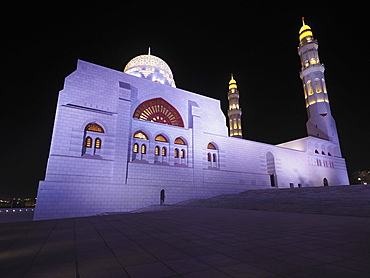Recent searches
Loading...
809-8545 - Mohammed al-Amine Sunni Mosque, Beirut, Lebanon, Middle East
809-8546 - St. George Maronite Cathedral bell tower and Mohammed al-Amine Sunni Mosque, Beirut, Lebanon, Middle East
809-8472 - Mohammed al-Amine Sunni Mosque and neighboring building, Beirut, Lebanon, Middle East
1350-1269 - Facade of a mosque, is part of Mausoleum of Mohammed V, Rabat, Morocco
1350-1270 - Interior of Mausoleum of Mohammed V, Rabat, Morocco
832-380725 - Night view of the Mohammed Al Ameen Mosque with minaret, illuminated, Muscat, Oman, Asia
832-380724 - Night view of the Mohammed Al Ameen Mosque with minaret, illuminated, Muscat, Oman, Asia
1245-980 - Mohammed Bin Ahmed Almulla Mosque, Dubai Marina, Dubai, United Arab Emirates, Middle East
746-53943 - Mohammed Issa Mosque, Tarim outskirts, Yemen, Middle East
844-11933 - Mohammed Al Ameen Mosque and traffic on Sultan Qaboos Street, Muscat, Oman, Middle East
844-11934 - Mohammed Al Ameen Mosque and traffic on Sultan Qaboos Street, Muscat, Oman, Middle East
844-11932 - Mohammed Al Ameen Mosque and traffic on Sultan Qaboos Street, Muscat, Oman, Middle East
785-1897 - The Mosque of Mohammed Ali in Cairo, Egypt, North Africa, Africa
1104-67 - Mohammed bin Abdulwahhab Mosque, the State Mosque of Qatar, Doha, Qatar, Middle East
809-5234 - Mohammed mosque and minaret in Baku's old city, UNESCO World Heritage Site, Baku, Azerbaijan, Central Asia, Asia
817-429109 - Sultan Ahmet I Mosque or Blue Mosque, built by the architect Davut Aga between 1603 and 1616 East view UNESCO World Heritage
817-429110 - Sultan Ahmet I Mosque or Blue Mosque, built by the architect Davut Aga between 1603 and 1616 View from the Cavalry Bazaar UNESCO World Heritage
817-407649 - Sinan Basha Mosque in Acre or Akko, Israel
1116-23510 - Cupola and lamps in the interior of the Prayer Hall of Mohammed Ali Mosque in the Citadel of Cairo, Al Qahirah, Egypt
857-33933 - Women in burqas flock like doves to the entrance of the main mosque at the Blue Mosque complex, Mazar-i-Sharif, Balkh Province, September 23, 2002. Wednesday mornings are reserved for women to come and worship at the mosque.Elaborate tilework and decorated spires adorn the mosque, also known as the Shrine of Hazrat Ali (Hazrat Ali was the son-in-law of the prophet Mohammed), who is believed to be buried here. The shrine, of particular importance for Afghanistan's Shi'ite Muslims, was first built in the 12th century, destroyed by Genghis Khan, and rebuilt in 1481. The current mosque, considered by some to be one of the most beautiful in Central Asia, is a modern restoration.
857-33936 - A man feeds white doves at dawn in front of the Blue Mosque, Mazar-i-Sharif, Balkh Province. Hundreds of doves, who are fed by worshippers and tended by special workers, live around the mosque, and it is thought that the place is so holy that a grey or brown dove will turn white if it lands on the Mosque. The mosque is also known as the Shrine of Hazrat Ali (Hazrat Ali was the son-in-law of the prophet Mohammed), who is believed to be buried here. The shrine, of particular importance for Afghanistan's Shi'ite Muslims, was first built in the 12th century, destroyed by Genghis Khan, and rebuilt in 1481. The current mosque, considered by some to be one of the most beautiful in Central Asia, is a modern restoration.
857-33935 - Tajik women proudly pose with their children, burqa's thrown back, in front of the main entrance to the Blue Mosque, Mazar-i-Sharif, Balkh Province. Wednesday mornings are reserved for women to come and worship at the mosque. Elaborate tilework and decorated spires adorn the mosque, also known as the Shrine of Hazrat Ali (Hazrat Ali was the son-in-law of the prophet Mohammed), who is believed to be buried here. The shrine, of particular importance for Afghanistan's Shi'ite Muslims, was first built in the 12th century, destroyed by Genghis Khan, and rebuilt in 1481. The current mosque, considered by some to be one of the most beautiful in Central Asia, is a modern restoration.
817-282700 - interior view of the Mohammed V Mosque, Tangier, Morocco
817-193936 - Panjim Goa, India, Muslims praying during the Jashn-Eid-Milad Un Nabi feast, to commemorate prophet Mohammed's birth
816-886 - Mosque of Mohammed Ali, Cairo, Egypt, North Africa, Africa
816-861 - Mosque of Mohammed Ali, Cairo, Egypt, North Africa, Africa
816-862 - Mosque of Mohammed Ali, Cairo, Egypt, North Africa, Africa
816-858 - Inside the Mosque of Mohammed Ali, Cairo, Egypt, North Africa, Africa
809-2144 - Mohammed V Mosque, Agadir, Morocco, North Africa
809-2142 - Mohammed V Mosque door, Agadir, Morocco, North Africa, Africa
809-142 - Mohammed Ali mosque, Cairo, Egypt, North Africa, Africa
685-1498 - Mosque of Mohammed Ali, The Citadel, Cairo, Egypt, North Africa, Africa
557-3016 - Mosque of Mohammed Ali, Citadel, Cairo, Egypt, North Africa, Africa
350-3507 - The Mohammed Ali Mosque at dawn, Cairo, Egypt, North Africa, Africa
350-3456 - Crowds of tourists before the Mohammed Ali Mosque, Cairo, Egypt, North Africa, Africa
505-1878 - Crowds before the Mohammed Ali Mosque, Cairo, Egypt, North Africa, Africa
350-3457 - The Mohammed Ali Mosque, Cairo, Egypt, North Africa, Africa
You reached the end of search results







































